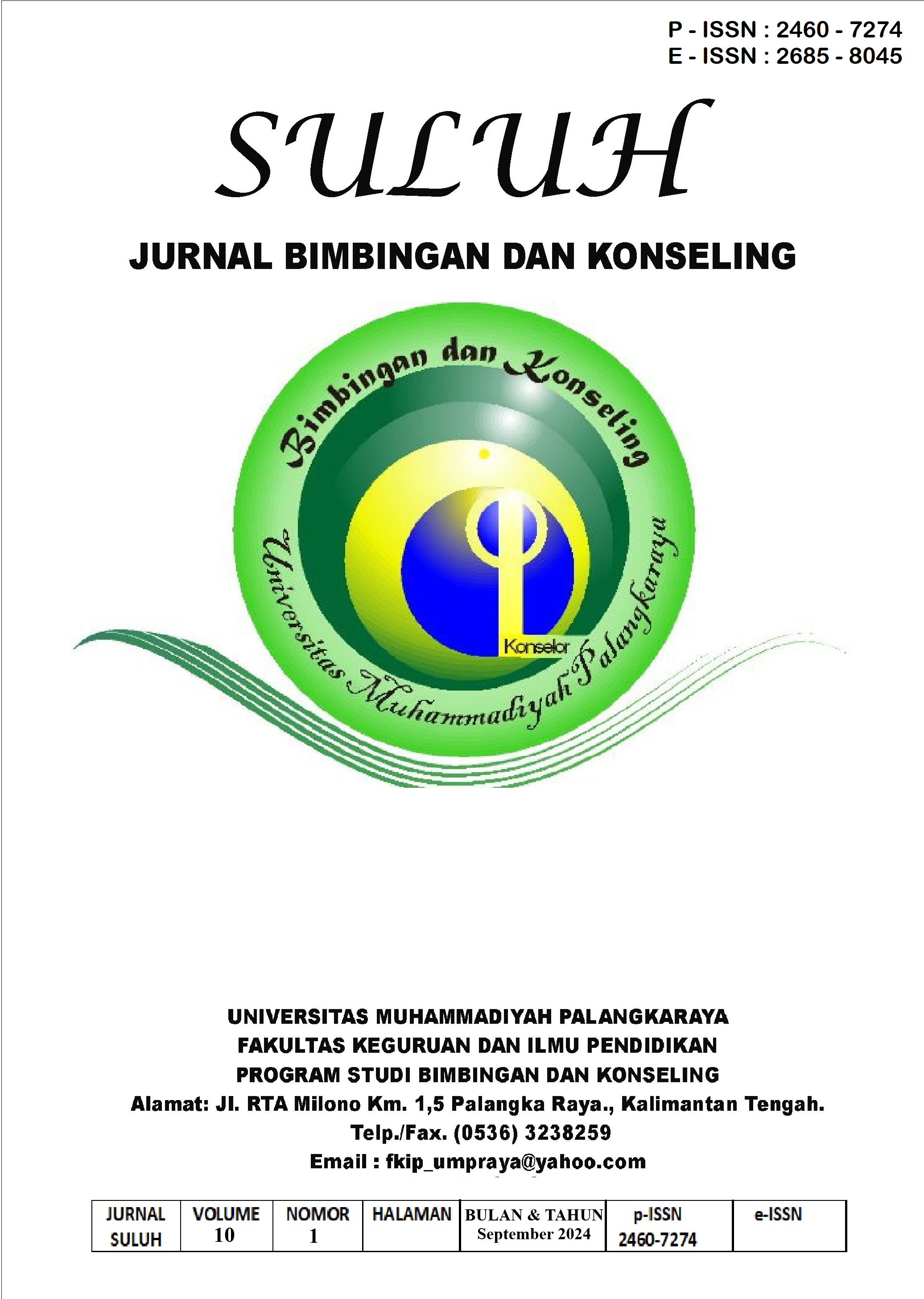Age and Psychological Well-being as Predictors of Male Child Parenting among Married Adults
Main Article Content
Abstract
Age is a critical factor in parenting, as parenting styles and attitudes can vary significantly across different age groups. Psychological well-being encompasses an individual's emotional health, life satisfaction, and overall mental state. The study examined age and psychological well-being as predictors of Male Child Parenting among married adults in Kwara State. A descriptive survey was used. The study was conducted on 384 married adults in Kwara Central Senatorial District, Kwara State, using a self-designed questionnaire called "Age and Psychological Wellbeing as Predictors of Male Child Parenting Questionnaire (APWDMCPQ). The questionnaire was validated by experts and its reliability was established through pilot testing using the Split-half method. The results were correlated using Spearman-Brown Correlation Coefficient Statistics (PBCCS) with a reliability index of 0.76. The study used mean and standard deviation to present answers to research questions, and Analysis of Variance (ANOVA) statistics to test hypotheses at a 0.05 level of significance. The study show that there is a significant effect of age on male child parenting (F.cal.=25.60, p.<0.05). The study found that there is no significant effect of psychological well-being on male child parenting (F.cal.=3.34, p.>0.05). The study found that age significantly impacts male-child parenting, but parental psychological well-being doesn't significantly affect it. It recommended that married adults aged 25-35 and 36-45 should seek counselling to develop appropriate parenting skills. Additionally, they should be educated on coping mechanisms to withstand the pressure of parenting male children, improving their psychological well-being and enabling effective male child parenting.
Downloads
Article Details

This work is licensed under a Creative Commons Attribution-ShareAlike 4.0 International License.
All rights reserved. This publication may be reproduced, stored in a retrieval system, or transmitted in any form or by any means, electronic, mechanical, photocopying, recording.
References
Agoha, B. C., Adewole, I., Adekeye, O., & Ayotunde, E. (2021). Parenting Style and Psychological Well-being of Secondary School Children. International Journal of Research and Innovation in Social Science, 5(11), 41-44.
Akinnawo, E. O., Akpunne, B. C., & Olajide, O. A. (2020). Perceived parenting styles and psycho-social well-being of Nigerian Adolescents. International Journal of Scientific Research and Management (IJSRM), 8(2), 628-637.
Akinyemi, A. I., & Isiugo-Abanihe, U. C. (2014). Demographic dynamics and development in Nigeria. African Population Studies, 27(2), 239-248.
Allgood, S. M., Beckert, T. E., & Peterson, C. (2012). The role of father involvement in the perceived psychological well-being of young adult daughters: A retrospective study. North American Journal of Psychology, 14(1), 95-110.
Anyama, S. C., Adeniyi, S. O., & Bolaji, S. D. (2022). Parental Stressors and Psychological Wellbeing of Parents of Children with Special Needs: Implications for Counselling. In African Education and Diaspora Studies (pp. 33-45). Charles Darwin University.
Anyanwu, J. I. (2010). Parental relationship as a correlate of psychological Wellbeing of south eastern Nigerian adolescents. African Journal of Teacher Education, 1(1).
Balraj, B. M. (2023). The Great Indian Kitchen-Cooking Its Way into the Indian Patriarchy System. System, 13(7), 131-137.
Bergh, C., Pinborg, A., & Wennerholm, U. B. (2019). Parental age and child outcomes. Fertility and sterility, 111(6), 1036-1046.
Breiner, H., Ford, M., Gadsden, V. L., & National Academies of Sciences, Engineering, and Medicine. (2016). Parenting knowledge, attitudes, and practices. In Parenting Matters: Supporting Parents of Children Ages 0-8. National Academies Press (US).
Bretherton, I. (2013). The origins of attachment theory: John Bowlby and Mary Ainsworth. In Attachment theory (pp. 45-84). Routledge.
Dennis, M. L. (2016). The Influence of Parental Mental Health on Child Outcomes: The Role of the Parenting Process. Loma Linda University.
Ecker, B., Ticic, R., & Hulley, L. (2012). Unlocking the emotional brain: Eliminating symptoms at their roots using memory reconsolidation. Routledge.
Fabbri, C., Bhatia, A., Petzold, M., Jugder, M., Guedes, A., Cappa, C., & Devries, K. (2021). Modelling the effect of the COVID-19 pandemic on violent discipline against children. Child abuse & neglect, 116, 104897.
Johnson, S. M. (2012). The practice of emotionally focused couple therapy: Creating connection. Routledge.
Kehoe, C. E., Havighurst, S. S., & Harley, A. E. (2015). Somatic complaints in early adolescence: The role of parents’ emotion socialization. The Journal of Early Adolescence, 35(7), 966-989.
Kuna, B., Galbarczyk, A., Klimek, M., Nenko, I., & Jasienska, G. (2018). Age difference between parents influences parity and number of sons. American Journal of Human Biology, 30(3), e23095.
Kyamru, J. I., & Samuel, E. S. (2016). Parental Age and Parity As Predictors of Child Neglect In Bauchi State, Nigeria. International Journal of Human Kinetics, Health and Education, 2(2).
Menta, G., & Lepinteur, A. (2021). Boys don’t cry (or do the dishes): family size and the housework gender gap. Journal of Economic Behavior & Organization, 186, 164-188.
Mobayo, A. O., Olusola, A. O., & Adejare, O. O. (2024). Counselling Parents of Persons with Disabilities on Availability, Uses and Benefits of Assistive Technology. Journal of African Sustainable Development.
Nwadinobi, V. N., Uzoezie, C. E., Umezulike, R. E. Q., & Afunugo, D. M. (2019). Inadequate Child Parenting as Precursor of Corrupt Practices in Nigeria: Counselling Implications. https://www.researchgate.net/profile/Vera-Nwadinobi/publication/336024900_Inadequate_Child_Parenting_as_Precursor_of_Corrupt_Practices_in_Nigeria/links/5d8b6ae3299bf10cff0bce1c/Inadequate-Child-Parenting-as-Precursor-of-Corrupt-Practices-in-Nigeria.pdf
Nwagwu, S. A. J., Ogbonnaya, N. P., Chinwuba, A. U., & Ihudiebube, S. C. (2023). Family Structure Moderates the Relationship between Parenting Styles and Psychological Well-being among Nursing Students. African Journal of Biomedical Research, 26(2), 215-222.
Ogundele, M. O. (2018). Behavioural and emotional disorders in childhood: A brief overview for Paediatricians. World journal of clinical pediatrics, 7(1), 9–26. https://doi.org/10.5409/wjcp.v7.i1.9
Okoroafor, E. C., & Njoku, J. C. (2012). Effective parenting and socialization for value re-orientation in contemporary Nigeria. International Journal of Development and Management Review, 7(1).
Shamah, R. M. (2011). Parenting Children of Different Ages: Adjusting Child Rearing Practices. ETD Collection for Pace University. https://digitalcommons.pace.edu/dissertations.
Sunita, C. S. J. S. (2022). The effects of parenting style on children’s behavior: a systematic literature review. The Pharma Innovation Journal, (11), 1695-1702.
Townsend, P. (2023). The family life of old people: An inquiry in East London. Taylor & Francis.
United Nations, Department of Economic and Social Affairs, Population Division (2022). World Population Prospects 2022, Online Edition. https://population.un.org/wpp/

